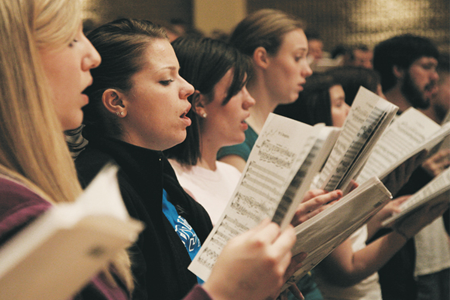It has been some time since I have posted. I’m going to take a brief departure from the series on adolescent development to address something that indirectly speaks to adolescent development and directly to our role in teaching, mentoring, and guiding adolescents in the context of student choir ministry. The situation that inspired this post is fresh on my mind; I thought I would bring my own struggle to the CueWeb community in hopes that it would enrich and enhance our larger discussion. Indulge me for a moment as I set the stage.
Teaching music at a private, Christian liberal arts institution certainly has its perks. Faculty are viewed as integral to the mission of the university, as most universities in this category describe themselves as “teaching and learning institutions” rather than “research institutions.” Collegiality is highly valued and a collaborative spirit is critical to success. Generally, students are motivated, enthusiastic, and hard working, eager to see their skills grow and develop within the framework of a spiritually enriching, academically rigorous, and socially supportive environment.
As with anything in life, however, teaching at this kind of institution has it drawbacks. Generally speaking, I have noticed a trend among our millennial generation in America. (insert *sigh*) There is a sense of entitlement that pervades the manner in which these young individuals operate on a daily basis. There is an unfortunate stereotype that a high number of these individuals attend private, Christian schools. These individuals often come from more affluent backgrounds where they have enjoyed the bounty of a two-income family during their adolescent years; thus, they can afford the higher tuition cost at such institutions. Academically, these students are high achieving and seem to possess a form of natural intelligence, receiving higher scores on standardized tests, involving themselves in a wide array of extra-curricular activities, and ranking high in their graduating class. Again, it is an unfortunate stereotype that while growing up, these students have had most things given to them or have had to complete modest work to gain the success and comfort they enjoy. These students then come to college and find that an internal battle is raging: “I deserve this degree. I deserve to be as successful as my parents. This should come rather easily. Prove to me, oh sage, that being in your class is worth my time.” (Again, I know these are stereotypes. They are not completely true everywhere 100% of the time. But they have become stereotypes because there consistently is some truth to them.)
You’re probably asking, “What in the world does this have to do with student choir ministry?”
Consider my email (below) to a student who seems to carry himself in the manner as I have just described. As the semester has unfolded, I noticed the impending doom for this student. His grades were suffering, his attendance was deplorable, and his attitude was lackadaisical. I recently completed the semester and issued final grades, and I knew that his fate had been sealed. (I removed the opening paragraph as to protect anonymity and personal information.)
While I respect your work, I’m not enthusiastic about the total body of work I have seen from you this semester. I’m not sure how to encourage you as you move forward in school. How are you doing in other classes?
I could tell you to care more, try harder, and force yourself to get up in the mornings. The truth is that we show up in life to the things we believe are important. But unfortunately, adulthood involves you showing up to things that someone else (namely your boss) says are important. Your opinion in the matter is often dead on arrival.
Life truth: We may not live what we SAY we believe, but we will uncontrollably live what we REALLY believe. Students will say they believe it’s important to show up for class, learn all that they can, and complete their degree. But their actions say something else.
So what is it you believe about the importance of your undergraduate education? What is it you believe you have been called to do? How are you preparing for that calling?
Your future success does not depend on what you do when you get that first “real” job or “big break.” Your success depends on how you are PREPARING for the day when those opportunities come your way. Let me put it more clearly and practically. If I were a music minister, I would not hire you because of your inconsistency and lack of dependability. Those issues will cost me more frustration in the long run. Hear this with a pastor’s heart…I don’t care if you do music ministry, or banking, or retail, or food service. That is not the issue. I think you would be great on staff in a music ministry somewhere. What I want more than anything, however, is for you to bear those characteristics of a Christ-follower that will help you be successful regardless of field of employment. I care less about you failing my class and more about your potential failure at life. Consistency and dependability will carry you far more than talent alone. My friend, you will have to trust me on this.
You are a brilliant young man with immense gobs of talent. You could write, speak, argue, defend, lead, and play circles around people in our class. But no one cares about that if you don’t show up.
At all costs, don’t join the littered landscape of talented individuals who lack discipline, humility, dependability, and consistency.
From one brother in Christ to another, with your future at heart and in mind,
Dr. R.
Student choir director, you have the opportunity, more than any other individual outside of a parental figure, to instill, cultivate, and imbed these invaluable, cherished, and seemingly rare personality traits in students BEFORE they come to college. The student choir is a veritable training ground—a petri dish, if you will—for experiments v in discipline, dependability, consistency, humility, honesty, faithfulness, truth, etc. These are hard lessons to teach and even harder to learn. But what better place to teach them than in the environment that only student choir can provide!
“Train up a child in the way he should go; even when he is old he will not depart from it.” –Proverbs 22:6 (ESV)
These words are undoubtedly directed to parents, the leaders of the God-ordained institution of the home. Yet, they were also wise words of wisdom meant for the entire Hebrew community. We need not think “it takes a village to raise a child.” The reality is that it takes a church to raise a child.
Once again, “cue student choir.” This is where we enter and fulfill the role that only student choir can play.
God bless you, student choir leaders, as you teach and lead students (through music) to experience the joy of serving God fully, humbly, passionately, dependably, and enthusiastically, regardless of where they find themselves “plowing fields” one day.









